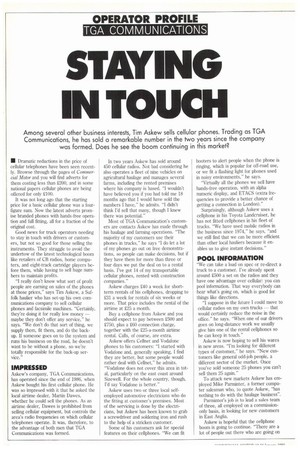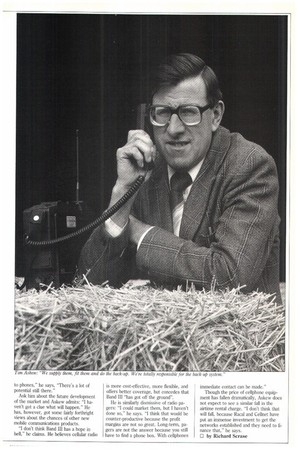STAYING IN TOUCH
Page 38

Page 39

If you've noticed an error in this article please click here to report it so we can fix it.
Among several other business interests, Tim Askew sells cellular phones. Trading as TGA Communications, he has sold a remarkable number in the two years since the company was formed. Does he see the boom continuing in this market?
IN Dramatic reductions in the price of cellular telephones have been seen recently. Browse through the pages of Commercial Motor and you will find adverts for them costing less than £200, and in some national papers cellular phones are being offered for only £100.
It was not long ago that the starting price for a basic cellular phone was a fourfigure sum. Now the latest adverts promise branded phones with hands-free operation and full fitting, all for a fraction of the original cost.
Good news for truck operators needing to stay in touch with drivers or customers, but not so good for those selling the instruments. They struggle to avoid the undertow of the latest technological boom like retailers of CB radios, home computers, and eight-track cartridge players before them, while having to sell huge numbers to maintain profits.
"I really don't know what sort of profit people are earning on sales of the phones at those prices," says Tim Askew, a Suffolk haulier who has set-up his own communications company to sell cellular phones and facsimile machines. "Certainly, they're doing it for really low money — maybe they don't offer any service," he says. "We don't do that sort of thing, we supply them, fit them, and do the backup. If someone goes on to the system and runs his business on the road, he doesn't want to be without a phone, so we're totally responsible for the back-up service."
IMPRESSED
Askew's company, TGA Communications, has operated since the end of 1986, when Askew bought his first cellular phone. He was so impresed with it that he asked the local airtime dealer, Martin Dawes, whether he could sell the phones. As an airtime dealer, Dawes is prohibited from selling cellular equipment, but controls the area's radio frequencies on which cellular telephones operate. It was, therefore, to the advantage of both men that TGA Communications was formed. In two years Askew has sold around 450 cellular radios. Not bad considering he also operates a fleet of nine vehicles on agricultural haulage and manages several farms, including the rented premises where his company is based. "I wouldn't have believed you if you had told me 18 months ago that I would have sold the numbers I have," he admits. "I didn't think I'd sell that many, though I knew there was potential."
Most of TGA Communication's customers are contacts Askew has made through his haulage and farming operations. "The majority of my customers use their phones in trucks," he says "I do let a lot of my phones go out on free demonstrations, so people can make decisions, but if they have them for more than three or four days we put the deal on to a rental basis. I've got 14 of my transportable cellular phones, rented with construction companies."
Askew charges 240 a week for shortterm rentals of his cellphones, dropping to £31 a week for rentals of six weeks or more. That price includes the rental of the airtime at £25 a month.
Buy a cellphone from Askew and you should expect to pay between £500 and £750, plus a £60 connection charge, together with the £25-a-month airtime rental. Calls, of course, are extra.
Askew offers Cellnet and Vodafone phones to his customers: "I started with Vodafone and, generally speaking, I find they are better, but some people would rather deal with Cellnet," he admits. "Vodafone does not cover this area in total, particularly on the east coast around Sizewell. For the whole country, though, I'd say Vodafone is better."
Askew uses two or three local selfemployed automotive electricians who do the fitting at customer's premises. Most of the servicing is done by the electricians, but Askew has been known to grab a screwdriver and soldering iron and rush to the help of a stricken customer.
Some of his customers ask for special features on their cellphones. "We can fit hooters to alert people when the phone is ringing, which is popular for off-road use, or we fit a flashing light for phones used in noisy environments," he says.
"Virtually all the phones we sell have hands-free operation, with an alpha numeric display, and ETACS (extra frequencies to provide a better chance of getting a connection in London)."
Surprisingly, although Askew uses a cellphone in his Toyota Landcruiser, he has not fitted cellphones in his fleet of trucks. "We have used mobile radios in the business since 1974," he says, "and we still find that we can be more efficient than other local hauliers because it enables us to give instant decisions."
POOL INFORMATION
"We can take a load on spec or re-direct a truck to a customer. I've already spent around £500 a set on the radios and they have one advantage over cellular: you can pool information. That way everybody can hear what's going on, which is good for things like directions.
"I suppose in the future I could move to cellular radios on my own trucks — that would certainly reduce the noise in the office." he says. "When one of our drivers goes on long-distance work we usually give him one of the rental cellphones so he can keep in touch."
Askew is now hoping to sell his wares in new areas. "I'm looking for different types of customer," he says. "New customers like general odd-job people, a different sector of the market. Once you've sold someone 25 phones you can't sell them 25 again."
To attack new markets Askew has employed Mike Parminter, a former computer salesman who, to quote Askew, "has nothing to do with the haulage business".
Parminter's job is to lead a sales team of three, all employed on a commissiononly basis, in looking for new customers in East Anglia.
Askew is hopeful that the cellphone boom is going to continue. "There are a lot of people out there who are going on to phones," he says, "There's a lot of potential still there."
Ask him about the future development of the market and Askew admits: "1 haven't got a clue what will happen." He has, however, got some fairly forthright views about the chances of other new mobile communications products.
"I don't think Band III has a hope in hell," he claims. He believes cellular radio is more cost-effective, more flexible, and offers better coverage, but concedes that Band III "has got off the ground".
He is similarly dismissive of radio pagers: "I could market them, but I haven't done so," he says. "I think that would be counter-productive because the profit margins are not so great. Long-term, pagers are not the answer because you still have to find a phone box. With cellphones
immediate contact can be made."
Though the price of cellphone equipment has fallen dramatically, Askew does not expect to see a similar fall in the airtime rental charge. "I don't think that will fall, because Racal and Cellnet have put an immense investment to get the networks established and they need to finance that," he says.
CI by Richard Scrase
































































































